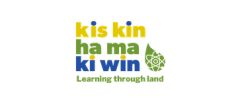In the summer of 2022, I attended my first Land-Based camp out at Little Limestone, and I knew my work ahead was going to be a dream come true. You see when I was younger, many of my K-12 teachers would often tell me, that the job I have now isn’t a real job. Going camping, hiking, being out in the bush or out on the lake was just a summer holiday hobby, and not much more than that.
Through my work over the past 3 years as a Land-Based Educator with the Environmental Conservation Lab (ECL), not only have I have been asked and welcomed into so many loving communities and schools, but more recently being asked to attend and facilitate Professional Development Days for many school divisions across the province. It is through my experiences here at the ECL, that I have also been given the opportunity to talk about our Provincial Curriculum ahead, with amazing leaders in Education like Sarah Gazan and Wade Houle.
KisKinHaMaKiWin is in its second phase of PromoScience funding, where through this application, we (the University of Manitoba) were able to partner with 3 Provincial School Divisions (7 Oaks, Frontier, and Pembina Trails), Grand Rapids School, as well as University College of the North (UCN), Fort Whyte Alive, Oak Hammock Marsh, Verna J. Kirkness, and more, to help make science accessible and engaging for our Indigenous Youth, hoping to address the lack of Indigenous representation in STEM fields. Coming from the Arts, I was looking at a different way to do things. Through Land-Based Learning, we have been able to bring in Elders and Knowledge Keepers to include the Indigenous Science and perspective, and through the help of the Water Rangers of Canada, we were able to do just that. Phase 2 started in a good way, meeting with all the partners, and having Elders Ellen Cook and Audrey Logan join us for our various discussions on setting out good intentions for the work ahead.
Before we even got approved for funding, I made sure to start doing the work before the work. I had such a good feeling that this would be approved and planned ahead.
“Water is Life” became the main presentation this year, where we worked alongside curriculum outcomes in the science and art classes with our partners. Session 1 was introducing myself to all the students, and began the work to start answering the questions; Who am I? and Where do I come from? Where does our power and water come from? What Treaty territories are we affecting with our decisions here in Manitoba?
Session 2 is where we brought in the Water Rangers testing kits to bring accessible water testing to the classroom and out in the field. By starting with the basics, we were able to connect with students and educators on the ease the testing kits bring in teaching about water quality. Each partner division was given 3 kits each for Early, Middle and Senior years classes.
Session 3 is where we asked the students to think about everything they have learned, and apply it to the 3 major questions asked of them; How do you use water throughout your day? How do you use electricity throughout your day? What actions can we take? My main outcome that most students were able to start connecting is that we need water to produce power, but we need power to produce water. We have a bright future ahead with so many students interested in keeping the land and waters protected.
This work has been incredibly humbling and so fulfilling. I have Ecole Crane and Cathy Page to thank for being my first school and classroom to facilitate to, as well as Shawna Nagler and Penny Riffel from Arthur A. Leach school, for launching off the first project “Water is Life.” Thank you, Jill Fast and Pembina Trails School Division for giving me the opportunity! Additionally, a big shout out to Rina Whitford and Shea Henderson from Fontier School Division, as well as Heather Eckton and Sherri Denisuik from 7 Oaks, I am so looking forward to my Practicum Placement at Maples Collegiate this coming year.
I also have a huge thank you for Dr’s Ramona Neckoway and Maya Rad-Spice from UCN, for this years MALS (Manitoba Aboriginal Language Symposium) convention. They gave me the opportunity to facilitate and plan this year’s Land-Based Workshops, where we gathered Elders, Knowledge Keepers, and Language Speakers to come together at the Boreal Discovery Center in Thompson, Manitoba. These two incredible leaders gave me the opportunity of a lifetime to make this event happen, with their incredible support, we were able to make this a successful event! We were able to gather Elders; Nellieane Cromarty, Marie Ballantyne, Melanie Molin, Theressa Bighetty, Diane Powderhorn, and U of M’s own Patricia Ningewance Nadeau. Thank you all for your love, support, and guidance through my term as Land-Based Educator and Program Coordinator.
My last thank you is to the Enviromental Conservation Lab, and the family we have there. Thank you for believing in me, thank you for giving me the opportunity to do what I love, and thank you for letting me share the love of Land-Based Education with our generations coming up. I will take everything I have learned with me as I enter into the Faculty of Education, and jump right into my Practicum this fall.
